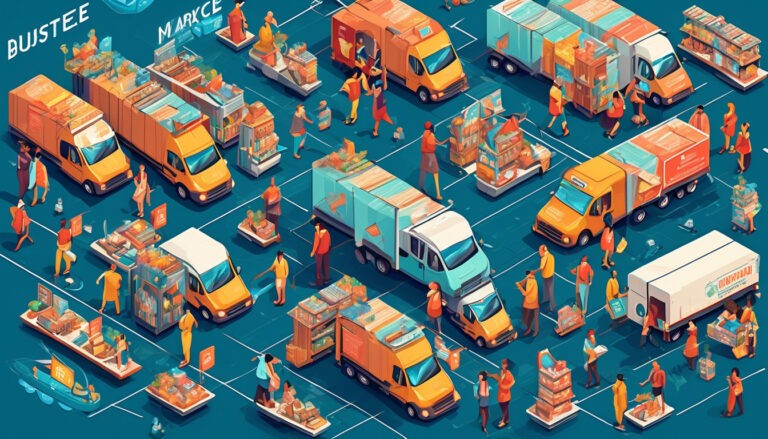As brick-and-mortar stores face increasing challenges, e-commerce is stepping in to shape the future of retail. It’s no surprise that online sales are booming, offering both convenience and a wider selection than traditional stores can provide.
From the comfort of their own homes, consumers can browse and buy products from around the globe, at any time of day or night. This shift isn’t just about consumer preference; it’s fueled by advances in technology and changes in shopping habits that are making e-commerce not just an alternative, but often the preferred method of shopping.
In this article, we’ll explore why e-commerce is quickly becoming the dominant force in retail, highlighting the key benefits that online sales offer to both businesses and customers.
Rapid Growth of Online Sales
Online sales have skyrocketed in recent years, transforming how you shop and interact with brands. You’re no longer confined to the limited hours of local stores. Instead, you can browse and buy anytime, anywhere. This convenience means you’re making purchases right from your couch, even at midnight.
With a multitude of choices just a click away, you’re able to compare products and prices effortlessly, ensuring you always get the best deal available.
E-commerce also caters to your desire for quick gratification with fast shipping options. Moreover, personalized shopping experiences through data analytics make it easier for you to find products that truly fit your needs and preferences, enhancing your overall shopping satisfaction.
Global Market Reach
E-commerce opens up a global market, allowing you to sell to and buy from anyone, anywhere in the world. This boundless reach means you’re no longer confined by geographic limitations. You can access a vast customer base, exponentially increasing your potential sales and growth opportunities.
It’s not just about selling, but also sourcing products. You can find suppliers from different corners of the globe, enhancing your product offerings and possibly reducing costs.
Expanding globally also diversifies your business risk. If one market experiences a downturn, you’re not solely dependent on it for your revenue. Instead, you can capitalize on the stability or upswing of other markets, maintaining a steady flow of income. This strategic advantage keeps you competitive and resilient.
24/7 Accessibility to Customers
E-commerce platforms offer the advantage of being accessible to customers around the clock, every day of the year. You can shop whenever you want, whether it’s the middle of the night or during a lunch break. This flexibility is perfect if you’re busy during traditional retail hours. Plus, you don’t have to worry about store closing times.
Whether it’s a holiday, weekend, or any other day, the online store is always open. This constant availability increases the potential for sales as consumers aren’t restricted by time.
You can make purchases at your convenience, ensuring you never miss out on what you need. This around-the-clock service not only enhances your shopping experience but also satisfies the modern need for instant and effortless access.
Cost-Effective Operations
E-commerce platforms significantly reduce operational costs by eliminating the need for physical storefronts. You save on rent, utilities, and the overhead associated with maintaining a brick-and-mortar location. This lean structure allows you to channel funds into other critical areas like marketing, product development, and customer service.
Additionally, managing your inventory becomes more streamlined with digital tools. You’re able to adjust stock levels more dynamically, reducing the risk of overstocking or stockouts. This efficiency not only cuts costs but also enhances your ability to respond to consumer demands quickly.
By investing in e-commerce, you’re not just saving money; you’re building a smarter, more responsive business that can adapt and thrive in a rapidly changing market.
Personalized Shopping Experience
E-commerce platforms enable you to offer a personalized shopping experience that tailors product recommendations and promotions to each customer’s interests and buying habits. This customization isn’t just about boosting sales; it’s about making your customers feel uniquely understood and catered to.
When you personalize your site, you’re showing your customers that they’re not just another number. You’re crafting an environment that resonates with them, increases their engagement, and encourages loyalty.
Imagine a shopper receiving suggestions for items they’ve shown interest in or deals on products they frequently buy. This tailored approach not only enhances their shopping experience but also significantly increases the likelihood of repeat visits and purchases.
Personalization is the key to standing out in the crowded online marketplace.
Data-Driven Decision Making
E-commerce platforms gather vast amounts of data, enabling you to make informed decisions that drive your business forward. By analyzing customer behavior, purchase history, and browsing patterns, you’ll unlock insights that can optimize your inventory, improve your marketing strategies, and increase sales. This data isn’t just numbers; it’s a roadmap showing what your customers love and what they don’t.
You can identify trends faster than ever before. This means you’re not just reacting to the market, you’re anticipating changes, staying ahead of demand curves. It’s about being proactive, not just reactive.
You’ll also refine your pricing strategies and product offerings based on real feedback, ensuring that your store continuously evolves to meet market demands and customer preferences efficiently.
Seamless Customer Service
E-commerce platforms enhance your ability to provide seamless customer service, ensuring that every interaction is swift and satisfactory. You can offer real-time support through live chats and AI-driven chatbots that handle inquiries instantly, around the clock. This accessibility boosts your customers’ confidence and satisfaction, making them more likely to return.
Integrated tools like CRM systems help you track customer interactions and preferences, enabling personalized service that anticipates needs and resolves issues quickly.
Automated emails and notifications keep your customers informed about their order status, reducing the number of inquiries and complaints. This streamlined communication not only saves you time but also significantly enhances the overall shopping experience for your customers.
Scalability for Business Expansion
E-commerce platforms offer scalable solutions that enable you to expand your business efficiently as demand grows. You don’t have to worry about the physical limitations of a brick-and-mortar store. Instead, you can increase inventory, add new product lines, and enter new markets without significant upfront investment. This flexibility allows you to respond quickly to market trends and consumer demands, adapting your offerings on the fly.
Moreover, the digital infrastructure of e-commerce means you can automate many processes, from inventory management to customer notifications. This automation not only reduces the need for additional staff as your business grows but also ensures consistency and reliability in customer services, making scaling up smoother and less resource-intensive.
How does e-commerce integrate with existing physical retail systems?
To integrate e-commerce with existing physical retail systems, you can use tools like inventory management software and POS systems that sync online and in-store sales.
This streamlines operations, improves customer experience, and boosts overall efficiency.
What are the cybersecurity risks associated with e-commerce, and how can they be mitigated?
To protect your online store, regularly update security software and use encryption for transactions.
Implement strong password policies and train staff on cybersecurity best practices.
Conduct routine security audits to identify and address vulnerabilities promptly.
How do cultural differences impact e-commerce strategies globally?
When expanding globally, consider cultural nuances. Tailor e-commerce strategies to resonate with diverse audiences.
Language, customs, and preferences vary across regions, impacting marketing, payment methods, and product offerings.
Embrace diversity for successful international sales.
Conclusion
In conclusion, e-commerce revolutionizes the retail sector by offering convenience, variety, and accessibility to customers worldwide.
Embracing online sales opens up endless opportunities for businesses to reach a broader audience and optimize their operations.
The future of retail lies in the digital realm, where seamless transactions and personalized shopping experiences redefine the way we shop.
Stay ahead of the curve by leveraging the power of e-commerce for sustained success in the evolving retail landscape.





